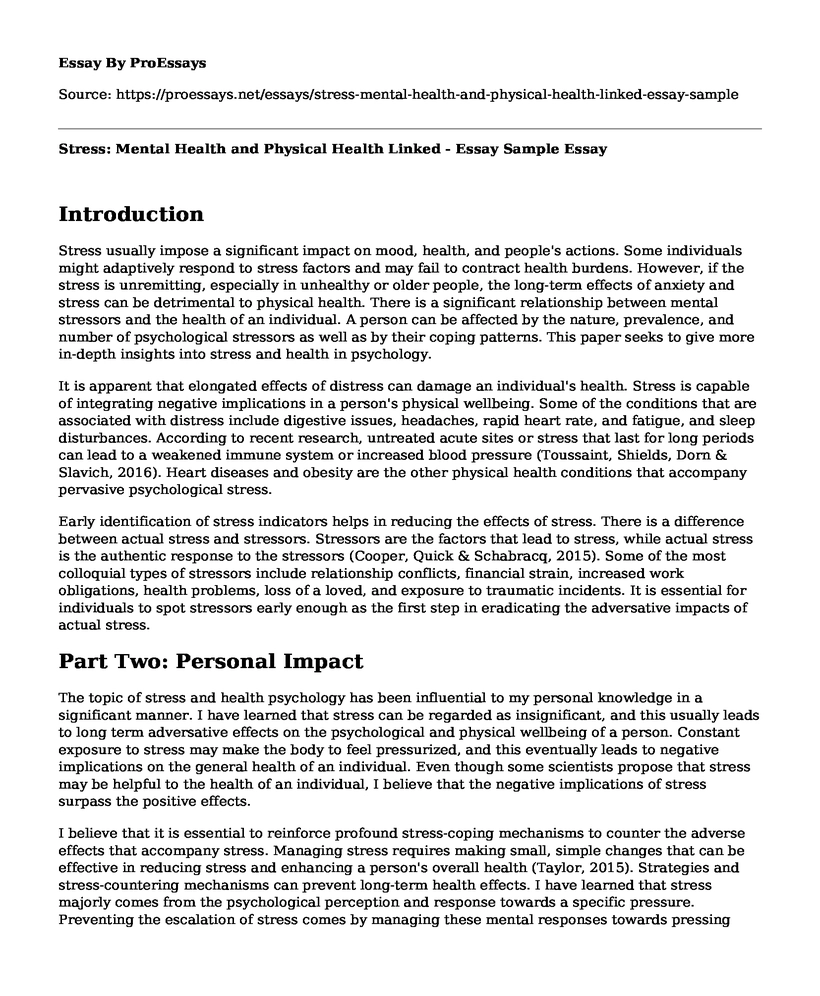Introduction
Stress usually impose a significant impact on mood, health, and people's actions. Some individuals might adaptively respond to stress factors and may fail to contract health burdens. However, if the stress is unremitting, especially in unhealthy or older people, the long-term effects of anxiety and stress can be detrimental to physical health. There is a significant relationship between mental stressors and the health of an individual. A person can be affected by the nature, prevalence, and number of psychological stressors as well as by their coping patterns. This paper seeks to give more in-depth insights into stress and health in psychology.
It is apparent that elongated effects of distress can damage an individual's health. Stress is capable of integrating negative implications in a person's physical wellbeing. Some of the conditions that are associated with distress include digestive issues, headaches, rapid heart rate, and fatigue, and sleep disturbances. According to recent research, untreated acute sites or stress that last for long periods can lead to a weakened immune system or increased blood pressure (Toussaint, Shields, Dorn & Slavich, 2016). Heart diseases and obesity are the other physical health conditions that accompany pervasive psychological stress.
Early identification of stress indicators helps in reducing the effects of stress. There is a difference between actual stress and stressors. Stressors are the factors that lead to stress, while actual stress is the authentic response to the stressors (Cooper, Quick & Schabracq, 2015). Some of the most colloquial types of stressors include relationship conflicts, financial strain, increased work obligations, health problems, loss of a loved, and exposure to traumatic incidents. It is essential for individuals to spot stressors early enough as the first step in eradicating the adversative impacts of actual stress.
Part Two: Personal Impact
The topic of stress and health psychology has been influential to my personal knowledge in a significant manner. I have learned that stress can be regarded as insignificant, and this usually leads to long term adversative effects on the psychological and physical wellbeing of a person. Constant exposure to stress may make the body to feel pressurized, and this eventually leads to negative implications on the general health of an individual. Even though some scientists propose that stress may be helpful to the health of an individual, I believe that the negative implications of stress surpass the positive effects.
I believe that it is essential to reinforce profound stress-coping mechanisms to counter the adverse effects that accompany stress. Managing stress requires making small, simple changes that can be effective in reducing stress and enhancing a person's overall health (Taylor, 2015). Strategies and stress-countering mechanisms can prevent long-term health effects. I have learned that stress majorly comes from the psychological perception and response towards a specific pressure. Preventing the escalation of stress comes by managing these mental responses towards pressing issues. Some of the effective strategies include finding a balance, being kind to oneself, depending on trustworthy people, getting enough rest, practicing relaxation exercises, and eating well-balanced, healthy meals.
In as much as stress preventing mechanisms, it is additionally essential to consider people whose health has already been affected by stress. Mental health professionals and therapists can be helpful to people with stress disorders. Typically, I have learned that stress-regulating mechanisms are critical in handling psychological and health issues that coincide with stress.
References
Cooper, C., Quick, J. C., & Schabracq, M. J. (Eds.). (2015). International handbook of work and health psychology. John Wiley & Sons.
Taylor, S. E. (2015). Health psychology. McGraw-Hill Education.
Toussaint, L., Shields, G. S., Dorn, G., & Slavich, G. M. (2016). Effects of lifetime stress exposure on mental and physical health in young adulthood: How stress degrades and forgiveness protects health. Journal of health psychology, 21(6), 1004-1014.
Cite this page
Stress: Mental Health and Physical Health Linked - Essay Sample. (2023, Mar 16). Retrieved from https://proessays.net/essays/stress-mental-health-and-physical-health-linked-essay-sample
If you are the original author of this essay and no longer wish to have it published on the ProEssays website, please click below to request its removal:
- Articles Summary: The Problem with Self-Investigation in a Post-Truth Era and My Problem with George Orwell
- Problem Solution Proposal: Suicide in Japan
- Love and Romance: The Right Chemistry Essay
- Empathic Confrontation in Counseling Paper Example
- Existential Therapy Essay Example
- Essay Sample on Unlock Your Boundaries: The Future of Career Success
- 44-Year-Old Woman: Anxiety, Depression, & Self-Medication - Essay Sample







